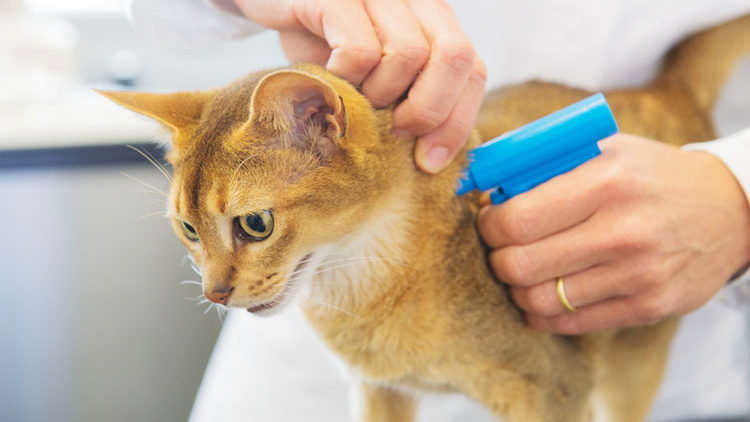It is very important to ensure your pet cat or dog is microchipped because if your pet cat or dog gets lost, you are far more likely to be reunited if they are microchipped.
What is a microchip? How does it work?
A microchip is a permanent method of electronic identification implanted subcutaneously between the shoulder blades at the back of your pet’s neck.
Each chip has a unique number that is detected using a microchip scanner. The microchip number is recorded on a microchip database registry with details about the animal and owner.
Pet owners need to ensure their contact details are recorded on the database against their pet’s microchip number. Should your pet wander or become lost, vets, animal shelters and local councils can scan your pet for a microchip and contact you via the database. It is very important to keep your contact details up to date on the database so that if you move house or change your phone number you will still be contactable in the event of your pet becoming lost/straying.
If a pet is transferred to a new owner, the new owner must ensure their contact details are recorded on the database.
Currently there is only one microchip registry in Kenya; manage by The East Africa Kennel Club.
Access to the database is given out on a yearly basis to vets at a cost of KES 1,000/- and to rescue organisations like the KSPCA and TNR Trust free of charge.
The cost of REGISTERING a microchip with The East Africa Kennel Club is KES 500/-
Read more about it here : http://eastafricakennelclub.com/eakc-services/microchipping/
Who do I contact if I need to change my contact details with my pet’s microchip registry database?
The easiest way to change your contact details is to contact the vet who implanted the microchip or the organization in charge of the database and provide them with your pet’s microchip number. If you are in Nairobi KSPCA Kenya may also be able to help you.
Is microchipping my pet cat or dog compulsory?
In Kenya microchipping is not mandatory. Ideally your pet cat or dog should be microchipped prior to you purchasing or adopting your pet. This is the only way to effectively trace the origin of the cat/dog. However, if your pet is not yet microchipped then we recommend that you make an appointment with your vet to have your pet microchipped.
Is microchipping painful?
Microchipping is a quick safe and simple procedure and causes little discomfort. Some puppies and kittens may flinch or yelp as the chip is implanted, however the pain is minimal and short-lived and most animals will forget about it very quickly.
Microchipping is very important for re-uniting lost pets with their owners. Should your pet go missing you are far more likely to be reunited if he or she is microchipped. The benefits of microchipping in terms of identifying a lost animal and reuniting them with their owner far outweigh any minimal, momentary discomfort.
When should microchipping be done?
Ideally your pet cat or dog should be microchipped prior to you purchasing or adopting your pet. This is the only way to effectively trace the origin of a cat or dog. However, if your pet is not yet microchipped then we recommend that you make an appointment with your vet to have your pet microchipped.
Where can I microchip my pet in Kenya?
Only authorised microchip implanters are permitted to microchip pets. Vets and animal welfare organisations can microchip pets. In Nairobi you can have your pet microchipped at:


